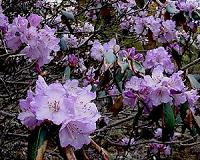 |
Warwick UK (SPX) Sep 15, 2010 Farming practices have a significant impact on the diversity of beneficial microbial fungi known to play important roles in crop productivity, soil recovery and maintenance of healthy ecosystems, according to new research published in the journal Environmental Microbiology. The conclusions could have important implications for the way humans manage the agricultural landscape and tackle food security issues. The study was led by Dr Christopher van der Gast at the Centre for Ecology and Hydrology (CEH), UK and Dr Gary Bending from the University of Warwick, UK. The research team investigated the distribution of important arbuscular mycorrhizal fungi (AMF), at nine arable and horticultural farms in England, with soil collected from both organically and conventionally managed fields at each farm. The results of the study indicate that farm management has a significant impact on AMF richness, with organic farming shown to promote higher diversity relative to conventional farming. AMF are a vital component of terrestrial ecosystems, representing a dominant microbial group in most soil habitats. Within the soil AMF form a mutually beneficial relationship with plant roots that is known to have a major impact on above ground ecology and productivity. Previously AMF distribution in space and time, like many microbes that dominate the biodiversity of soils, was poorly understood. Lead author Dr Christopher van der Gast, an environmental microbiologist at the Centre for Ecology and Hydrology, said, "Our research demonstrates that the way humans manage the landscape can play a key role in determining the distribution of microbial communities at both the local and regional scales." AMF community composition reflected strains adapted to both local soil conditions and the specific management practice imposed. The findings suggest that conventional management practices dampened local differences in community composition, selecting a limited assemblage of common strains. Co-author Dr Gary Bending,from the University of Warwick, said, "The work provides us with new understanding which we can use to promote these fungi in agricultural systems. "This in turn could improve crop production. With the proportion of the earth's surface which is managed by humans increasing rapidly, this understanding is essential if we are to predict and manage microbial functioning in the environment to meet many of the major challenges faced by human society, such as food supply and the mitigation of climate change. "Addressing these challenges, whilst maintaining environmentally sustainable agricultural practices, requires an understanding of microbial diversity."
Share This Article With Planet Earth
Related Links Centre for Ecology and Hydrology Farming Today - Suppliers and Technology
 A Gardening Gift May Hold Key To Biodiversity
A Gardening Gift May Hold Key To BiodiversityEdinburgh UK (SPX) Sep 15, 2010 Gardeners are used to cross-breeding flowers to produce pretty petals or sweet scents - now scientists have shown the importance of nature's talent for producing new types of flowers. DNA analysis of wild evergreen rhododendrons in the Himalayas has suggested that hundreds of species of the plant could be derived from hybrids - cross-breeds between different species. Their findings m ... read more |
|
| The content herein, unless otherwise known to be public domain, are Copyright 1995-2010 - SpaceDaily. AFP and UPI Wire Stories are copyright Agence France-Presse and United Press International. ESA Portal Reports are copyright European Space Agency. All NASA sourced material is public domain. Additional copyrights may apply in whole or part to other bona fide parties. Advertising does not imply endorsement,agreement or approval of any opinions, statements or information provided by SpaceDaily on any Web page published or hosted by SpaceDaily. Privacy Statement |